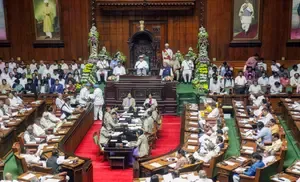Greater Bengaluru Governance Bill 2024 Secures Passage in Assembly Despite Opposition Walkout

Synopsis
Key Takeaways
- Decentralisation of governance in Bengaluru through multiple corporations.
- Passed in the Legislative Assembly despite opposition walkout.
- Bill aims to improve local governance and decision-making.
- Establishment of new corporations to address rapid city growth.
- Financial support for weaker local bodies included in the Bill.
Bengaluru, March 10 (NationPress) The Greater Bengaluru Governance Bill 2024, designed to decentralise the governance structure of Bengaluru by establishing multiple corporations, was successfully passed in the Legislative Assembly today despite the opposition's walkout.
Deputy Chief Minister D. K. Shivakumar, who also serves as the Bengaluru Development Minister, remarked, “The current governance model of Bengaluru is challenging to manage, a sentiment even the opposition acknowledges. The city has expanded significantly beyond its original boundaries established by its founder, Kempe Gowda, and this growth cannot be undone.”
Shivakumar further expressed, “The Greater Bengaluru Governance Bill 2024 will tackle the existing challenges. I appreciate all members who contributed to the discussion on this Bill and recognise their concerns.”
“Our goal is not to fragment Bengaluru but to fortify it. We are committed to maintaining the city's esteemed status as a global hub that attracts individuals from across the globe,” he continued.
Shivakumar explained that the Bengaluru district was previously segmented into three districts, with Udupi separated from Dakshina Kannada, and new districts Gadag and Haveri established. The aim of dividing the Bruhat Bengaluru Mahanagara Palike (BBMP) is to enhance governance. Although some express concerns that decentralisation may complicate grant allocations, he clarified that according to the 75th Amendment, local body funds cannot be redirected to other uses. The Bill also includes provisions for financial support to weaker local bodies.”
BJP MP Ashwath Narayan voiced objections regarding granting voting rights to nominated members.
In response, Shivakumar assured that the Greater Bengaluru Authority will not include any nominated members.
Concerns were also raised about the Chief Minister's availability for Bengaluru affairs, highlighting that roughly 25% of the state's population resides in the city, thus emphasizing the CM's responsibility to address their needs.
This Bill is expected to facilitate quicker decision-making, a significant issue that has hindered numerous projects in the past. Shivakumar illustrated, “Had we completed the Peripheral Ring Road as initially planned, it would have been realised for approximately Rs 3000-4000 crores, whereas today, costs have surged to Rs 26,000 crores.”
“We aim to redirect Bengaluru towards becoming a global city through this legislation. This Bill is of utmost importance. Given the rapid growth of the city, it is impractical for one commissioner and one chief engineer to oversee operations. With future needs in mind, we are establishing seven corporations. The Bill incorporates changes regarding city planning, empowering MLAs with significant authority. It also establishes Ward Committees, with MLAs and MPs as members of the corporations, while the CM will serve as president and district in-charge ministers as vice presidents,” he elaborated.
The Greater Bengaluru Authority will comprise CEOs, commissioners, and MDs from various agencies including police, BWSSB, BMTC, BMRTC, disaster management authority, fire department, traffic police, slum development board, BESCOM, BMLTA, and BDA, all tasked with specific responsibilities. The Bill allows for the creation of up to seven corporations within the Bengaluru city, with the final number to be determined in consultation with MLAs. Each corporation must have a minimum population of 10 lakh and a revenue collection of at least Rs 300 crore, with all corporations named after Bengaluru and designated for specific regions,” he added.
Shivakumar assured that assembly constituencies will remain intact within corporations. The tenure for each corporation is set at five years, with the Mayor and Deputy Mayor serving terms of two and a half years, respectively.
In response to concerns from Leader of the Opposition R. Ashoka and BJP MLA S. R. Vishwanath, Shivakumar stated, “Originally, Bengaluru was one district, but it was later divided into Bengaluru Urban, Bengaluru Rural, and Ramanagara, with governance efficiency in mind. This Bill seeks to accomplish a similar outcome.”










